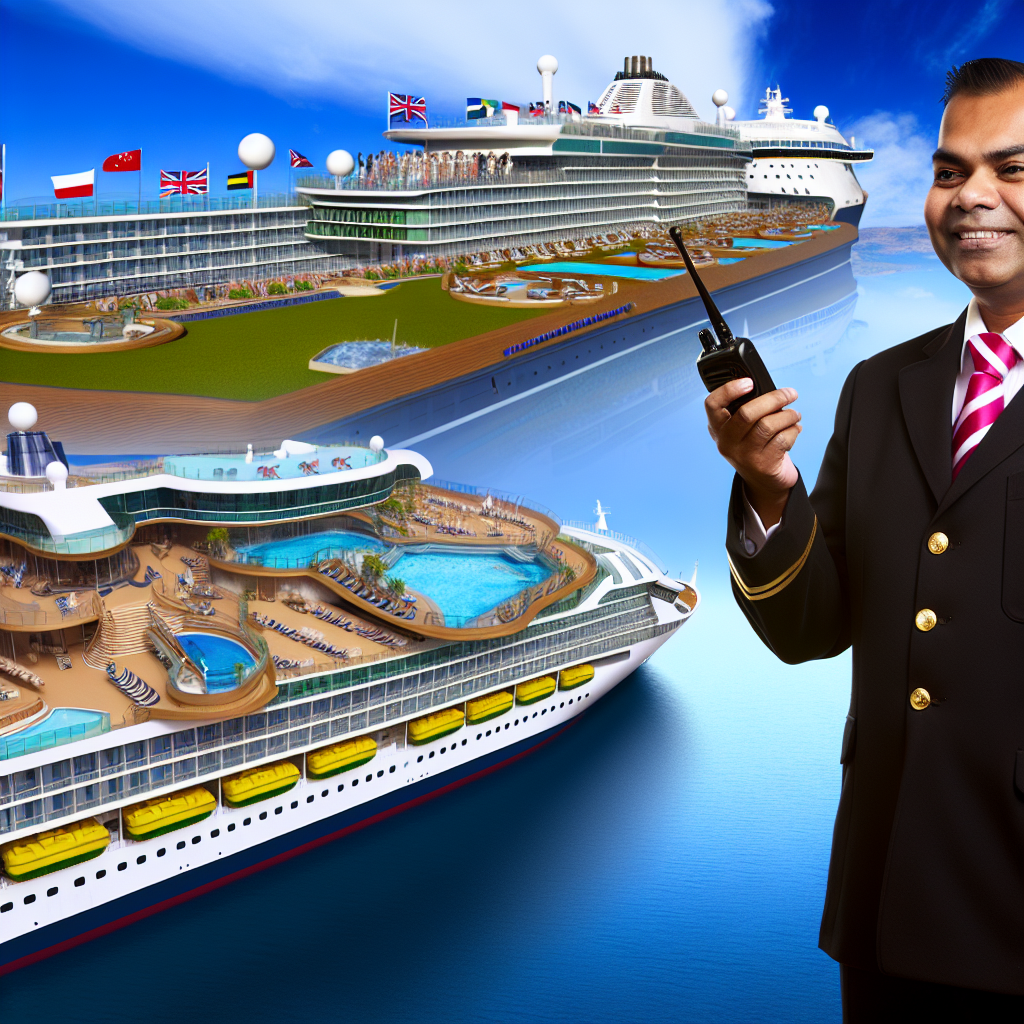Overview of the Role of a Cruise Director
Key Responsibilities
A cruise director serves as the heart of the cruise experience.
They oversee entertainment and activities for guests on board.
This role requires exceptional organizational skills and charisma.
Cruise directors plan daily schedules that cater to diverse interests.
They coordinate with various departments onboard for seamless operations.
Their job includes leading events and ensuring guest satisfaction.
Additionally, they act as the main point of contact for guests.
Essential Skills
Communication skills are vital for a cruise director’s success.
They must engage with guests of all ages and backgrounds.
Leadership abilities help them manage a team effectively.
Problem-solving skills are also crucial in dynamic environments.
Cruise directors often handle unexpected challenges daily.
Cultural awareness enhances their interactions with international passengers.
The Importance of Entertainment
Entertainment drives guest engagement on a cruise ship.
Cruise directors curate a variety of shows and activities.
Personalized UK Career Consulting
Receive tailored career guidance designed just for you. Get actionable steps and expert support to boost your career in 1-3 days. Take control of your career now.
Get StartedThey ensure a balanced mix of entertainment options.
This may include live performances, games, and themed parties.
Moreover, they collaborate with artists and entertainers proficiently.
Guest Interaction
Building rapport with guests is a key aspect of the role.
Cruise directors greet passengers and introduce key events.
They frequently engage in conversations to understand guests’ preferences.
Personalized interactions elevate the overall cruise experience.
Tour plans often include excursions that cater to guests’ interests.
Challenges Faced
A cruise director often deals with high-pressure situations.
Managing large crowds during events can be daunting.
Weather conditions occasionally affect scheduled activities.
They must adapt quickly to keep guest morale high.
Ensuring safety and compliance with regulations is paramount.
Key Responsibilities in Managing Activities and Entertainment
Coordinating Daily Events
Cruise directors plan and schedule daily activities on board.
Your Dream Job Starts with a Perfect CV
Get a tailored CV and cover letter that captures your unique strengths and stands out in your industry. Let us help you make an unforgettable first impression.
Get StartedThey organize entertainment options for passengers of all ages.
This includes games, shows, and interactive experiences.
Additionally, they ensure proper equipment and resources are available.
When necessary, they adjust schedules to accommodate guest preferences.
Engaging with Passengers
Cruise directors actively interact with guests each day.
They welcome newcomers and encourage participation in events.
Listening to passenger feedback helps them enhance experiences.
They foster a lively atmosphere by being approachable and enthusiastic.
Managing Staff and Performers
Working with a diverse team is vital for success.
Cruise directors assign tasks to staff based on their skills.
They oversee performers, ensuring high-quality shows and events.
Regular training sessions help maintain team morale and efficiency.
Organizing Special Events
Special events create memorable moments for passengers.
Cruise directors coordinate themed parties and celebrations.
Optimize Your LinkedIn for Success
Boost your LinkedIn profile with a professional bio, keyword-rich headline, and strategic recommendations that attract recruiters. Stand out from the crowd and get noticed.
Optimize NowThey also plan unique activities for holidays and milestones.
Involving the crew promotes a sense of community on board.
Ensuring Safety and Compliance
Safety remains a top priority in all activities.
Cruise directors ensure that events adhere to safety regulations.
They conduct safety training for staff involved in activities.
First aid resources are always available during events.
Evaluating and Improving Programs
Continuous evaluation improves guest experiences.
Cruise directors gather feedback after events and activities.
They analyze participation rates to identify popular trends.
This data informs future programming and event planning.
Coordination with Various Departments on Board
Understanding the Role of a Cruise Director
A cruise director serves as the main coordinator on board.
This individual oversees entertainment and guest experiences.
They manage schedules and events across the ship.
Effective communication is vital for their success.
Collaborating with Entertainment Teams
The cruise director works closely with entertainment managers.
They plan shows, parties, and activities for guests.
This collaboration ensures a vibrant and engaging atmosphere.
The director allocates time slots for various performances.
Engaging with Hospitality Staff
The cruise director also interacts with the hospitality teams.
They coordinate dining times and special events.
Attention to detail enhances guest satisfaction.
Response to guest feedback helps refine services.
Coordinating with Safety and Security Teams
An important aspect of the cruise director’s role is safety.
They collaborate with security staff to ensure guest safety.
This includes conducting safety drills and emergency procedures.
Regular briefings keep everyone informed and prepared.
Working with Shore Excursion Teams
The cruise director plans shore excursions with dedicated teams.
They ensure excursions align with guest interests and safety requirements.
This enhances the overall cruise experience.
Feedback is collected to improve future excursions.
Aligning with Marketing and Sales Departments
Collaboration extends to marketing and sales teams.
The cruise director promotes onboard events to passengers.
Effective marketing drives participation and engagement.
Sales teams help communicate special offers and packages.
Feedback Loops with Guests
A successful cruise director gathers feedback from passengers.
This feedback aids in improving services and events.
They often hold Q&A sessions to address guest concerns.
This two-way communication fosters a better experience.
Gain More Insights: UK Hospitality Careers in the Post-COVID World: What’s Changing?
Guest Interaction and Customer Service Strategies
Cultivating a Welcoming Atmosphere
Cruise directors play a pivotal role in creating a warm environment.
They engage with guests from the moment they board the ship.
Greeting each guest with a smile builds immediate rapport.
Additionally, personalizing interactions makes guests feel valued.
Small gestures, like remembering names, enhance guest experience.
Effective Communication Techniques
Clear communication fosters positive interactions aboard the ship.
Cruise directors use various channels to convey important information.
They provide daily briefings about events and schedules.
Moreover, they encourage guests to ask questions freely.
Using approachable language makes guests comfortable.
Addressing Guest Concerns Promptly
Listening actively to concerns is crucial in customer service.
Cruise directors promptly address any complaints or issues.
A swift response helps maintain guest satisfaction throughout the cruise.
Furthermore, offering solutions demonstrates commitment to service.
Regularly following up ensures that concerns are resolved effectively.
Creating Memorable Activities
Engaging activities enhance guest interaction on cruises.
Cruise directors organize a variety of entertainment options.
From trivia nights to themed parties, there’s something for everyone.
Activities encourage guests to connect with each other.
Creating camaraderie among guests enriches the overall experience.
Feedback and Continuous Improvement
Gathering feedback is essential for service enhancement.
Cruise directors often conduct surveys to gauge guest satisfaction.
They take constructive feedback seriously to improve services.
Implementing changes based on guest suggestions boosts morale.
Ultimately, this dedication to improvement fosters loyalty.
You Might Also Like: Behind the Scenes of Event Management: The Untold Story of UK Tourism
Crisis Management and Emergency Protocols
Importance of Preparedness
Cruise directors prioritize crisis management in every decision they make.
They prepare for emergencies to ensure the safety of all guests and crew members.
Training is a vital component of this preparedness.
Cruise directors conduct regular drills, often simulating various emergency scenarios.
This training enhances the crew’s response time and efficiency during real emergencies.
Emergency Response Protocols
Specific protocols guide cruise directors in handling emergencies effectively.
Directors coordinate communication between different departments during a crisis.
They utilize established hierarchies to ensure quick and structured responses.
Moreover, they maintain a well-stocked emergency supply of essentials on board.
Supplies include first aid kits, water, and food, ensuring guests’ basic needs are met.
Communication Strategies
Effective communication is crucial during an emergency.
Directors use multiple channels to relay information to guests and crew.
They often employ public address systems and digital displays.
Additionally, they create pre-prepared messages to ensure clarity and consistency.
The goal is to keep everyone informed without inciting panic.
Post-Emergency Evaluation
After any crisis, directors participate in a thorough review process.
This evaluation identifies strengths and weaknesses in the emergency response.
The team discusses what went well and areas needing improvement.
Based on these insights, they adjust protocols for future preparedness.
This continuous evaluation helps enhance the overall safety culture aboard the ship.
Delve into the Subject: UK Hospitality Jobs: High-Earning Roles You Didn’t Know Existed

Planning and Organizing Shore Excursions
Understanding the Role of Shore Excursions
Shore excursions enhance the cruise experience for travelers.
They provide unforgettable opportunities to explore new destinations.
Moreover, these activities contribute significantly to passenger satisfaction.
Assessing Destination Offerings
Cruise directors evaluate potential shore excursion locations carefully.
They research local attractions and cultural experiences.
Local partnerships ensure authentic interactions with hosts in each destination.
Designing a Diverse Itinerary
Creating a diverse itinerary attracts a wide range of enthusiasts.
Directors include options like adventurous outdoor activities and cultural tours.
Additionally, they offer relaxing experiences such as beach days and spa visits.
Coordinating Logistics and Safety
Logistical planning remains crucial when organizing excursions.
Directors schedule transportation, ensure safety standards, and confirm bookings.
They also communicate clearly with passengers regarding safety briefings.
Promoting Excursions Effectively
Successful promotions bring awareness to shore excursion options.
Cruise directors utilize onboard presentations and printed materials.
Furthermore, they leverage social media to reach broader audiences.
Gathering Feedback for Improvement
Post-excursion feedback helps refine future offerings.
Cruise directors conduct surveys to assess passenger satisfaction.
They use this information to enhance upcoming shore excursion experiences.
Explore Further: UK Event Planning Certifications
Training and Leading the Cruise Staff
Understanding the Role of a Cruise Director
A cruise director is essential for creating memorable experiences.
They oversee the entire onboard entertainment team.
This role combines leadership, organization, and communication skills.
Recruitment and Selection Process
Selecting the right staff is crucial for success.
Cruise directors screen candidates for personality and skills.
They look for individuals who excel under pressure.
Team players who bring a positive attitude are highly valued.
Comprehensive Training Programs
Training programs equip staff with necessary skills.
These programs cover guest relations, emergency procedures, and entertainment.
Hands-on training prepares staff for real-life scenarios.
Shadowing experienced team members enhances learning opportunities.
Building Team Cohesion
Fostering a positive work environment is essential.
Regular team meetings promote open communication.
Directors encourage team bonding through social activities.
Celebrating team achievements boosts morale and unity.
Continuous Evaluation and Feedback
Regular performance evaluations help identify improvement areas.
Directors provide constructive feedback to enhance skills.
Routine check-ins ensure staff feel supported and recognized.
Encouraging self-assessment promotes personal growth and accountability.
Leading by Example
A successful cruise director embodies the values of the company.
They model professionalism and exceptional service.
Directors maintain a positive attitude even in challenging situations.
This attitude inspires the staff to deliver their best effort.
Use of Technology in Cruise Management and Guest Engagement
Enhancing Guest Experience with Mobile Applications
Cruise lines increasingly embrace mobile applications for guest engagement.
These apps provide real-time updates on activities and events.
Guests can make reservations for dining and excursions easily.
Furthermore, they can access their account information on-the-go.
Utilizing Data Analytics for Personalized Services
Cruise directors leverage data analytics to customize guest experiences.
They analyze past behaviors to tailor offers and recommendations.
This personal touch enhances guest satisfaction significantly.
Moreover, it allows cruise lines to anticipate guest needs more effectively.
Incorporating Virtual Reality into Shore Excursions
Virtual reality technology enhances the exploration of shore excursions.
Guests can preview experiences before committing to bookings.
This innovation enriches the decision-making process for excursions.
Additionally, it adds excitement and anticipation for guests.
Utilizing Social Media for Real-Time Engagement
Cruise directors actively engage with guests through social media platforms.
They share updates and highlight special events during the cruise.
Guests appreciate the immediate access to information and interaction.
This approach fosters a sense of community among passengers.
Implementing Smart Technology on Board
Smart technology is becoming integral to modern cruise ships.
Features like automated check-ins streamline the embarkation process.
Additionally, smart room technology provides personalized settings for guests.
This innovation enhances comfort and convenience during their stay.
Additional Resources
If cruising is the answer for Liverpool, what was the question?
TIPPING IN DR RESORTS : r/PuntaCana
[E-Book for Sale]
500 Cutting-Edge Tech Startup Ideas for 2024 & 2025: Innovate, Create, Dominate
$19.99 • 500 Tech Startup Ideas • 62 pages
You will get inspired with 500 innovative tech startup ideas for 2024 and 2025, complete with concise descriptions to help you kickstart your entrepreneurial journey in AI, Blockchain, IoT, Fintech, and AR/VR.




